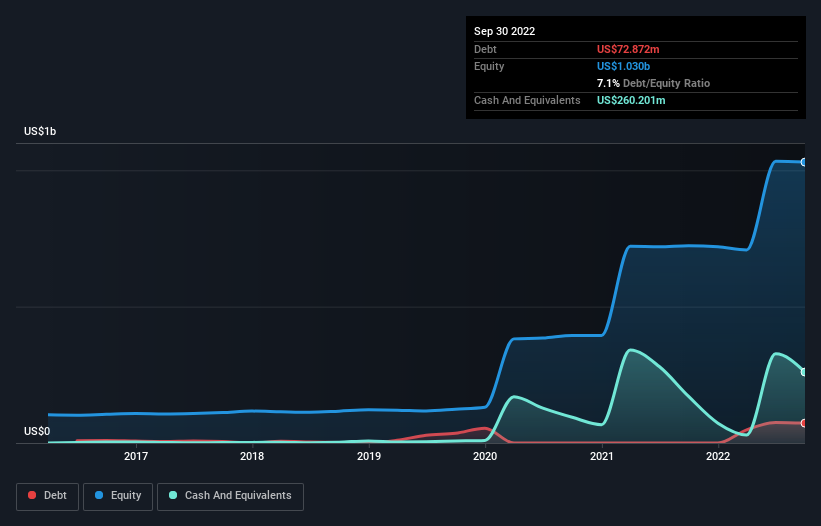
Some say volatility, rather than debt, is the best way to think about risk as an investor, but Warren Buffett famously said that 'Volatility is far from synonymous with risk.' So it might be obvious that you need to consider debt, when you think about how risky any given stock is, because too much debt can sink a company. As with many other companies Freshpet, Inc. (NASDAQ:FRPT) makes use of debt. But the more important question is: how much risk is that debt creating?
When Is Debt A Problem?
Debt is a tool to help businesses grow, but if a business is incapable of paying off its lenders, then it exists at their mercy. If things get really bad, the lenders can take control of the business. However, a more usual (but still expensive) situation is where a company must dilute shareholders at a cheap share price simply to get debt under control. Having said that, the most common situation is where a company manages its debt reasonably well - and to its own advantage. The first thing to do when considering how much debt a business uses is to look at its cash and debt together.
Check out our latest analysis for Freshpet
What Is Freshpet's Debt?
As you can see below, at the end of September 2022, Freshpet had US$72.9m of debt, up from none a year ago. Click the image for more detail. But on the other hand it also has US$260.2m in cash, leading to a US$187.3m net cash position.

How Healthy Is Freshpet's Balance Sheet?
We can see from the most recent balance sheet that Freshpet had liabilities of US$131.0m falling due within a year, and liabilities of US$4.59m due beyond that. Offsetting this, it had US$260.2m in cash and US$48.2m in receivables that were due within 12 months. So it can boast US$172.9m more liquid assets than total liabilities.
This surplus suggests that Freshpet has a conservative balance sheet, and could probably eliminate its debt without much difficulty. Simply put, the fact that Freshpet has more cash than debt is arguably a good indication that it can manage its debt safely. The balance sheet is clearly the area to focus on when you are analysing debt. But it is future earnings, more than anything, that will determine Freshpet's ability to maintain a healthy balance sheet going forward. So if you're focused on the future you can check out this free report showing analyst profit forecasts.
In the last year Freshpet wasn't profitable at an EBIT level, but managed to grow its revenue by 38%, to US$545m. Shareholders probably have their fingers crossed that it can grow its way to profits.
So How Risky Is Freshpet?
By their very nature companies that are losing money are more risky than those with a long history of profitability. And the fact is that over the last twelve months Freshpet lost money at the earnings before interest and tax (EBIT) line. And over the same period it saw negative free cash outflow of US$318m and booked a US$66m accounting loss. But at least it has US$187.3m on the balance sheet to spend on growth, near-term. Freshpet's revenue growth shone bright over the last year, so it may well be in a position to turn a profit in due course. Pre-profit companies are often risky, but they can also offer great rewards. There's no doubt that we learn most about debt from the balance sheet. However, not all investment risk resides within the balance sheet - far from it. Case in point: We've spotted 2 warning signs for Freshpet you should be aware of.
If, after all that, you're more interested in a fast growing company with a rock-solid balance sheet, then check out our list of net cash growth stocks without delay.
New: AI Stock Screener & Alerts
Our new AI Stock Screener scans the market every day to uncover opportunities.
• Dividend Powerhouses (3%+ Yield)
• Undervalued Small Caps with Insider Buying
• High growth Tech and AI Companies
Or build your own from over 50 metrics.
Have feedback on this article? Concerned about the content? Get in touch with us directly. Alternatively, email editorial-team (at) simplywallst.com.
This article by Simply Wall St is general in nature. We provide commentary based on historical data and analyst forecasts only using an unbiased methodology and our articles are not intended to be financial advice. It does not constitute a recommendation to buy or sell any stock, and does not take account of your objectives, or your financial situation. We aim to bring you long-term focused analysis driven by fundamental data. Note that our analysis may not factor in the latest price-sensitive company announcements or qualitative material. Simply Wall St has no position in any stocks mentioned.
About NasdaqGM:FRPT
Freshpet
Manufactures, distributes, and markets natural fresh meals and treats for dogs and cats in the United States, Canada, and Europe.
Reasonable growth potential with proven track record.
Similar Companies
Market Insights
Community Narratives




